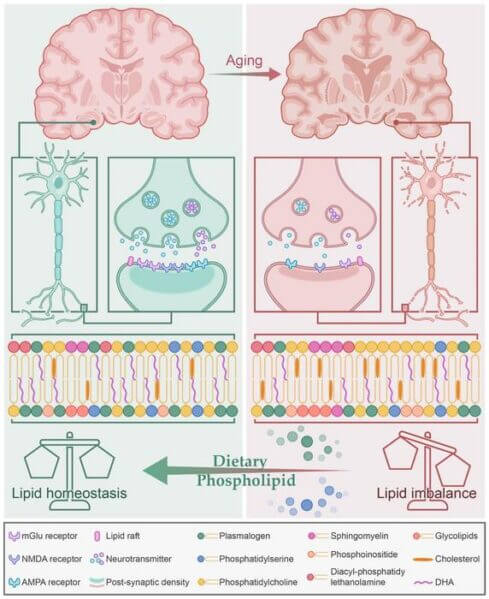A new review published in the journal Engineering by Fazheng Ren’s research team at China Agricultural University highlights the significant role of dietary lipids in preventing brain aging and cognitive decline. As the global burden of aging-related brain diseases, particularly dementia, continues to rise, this research offers promising insights into potential nutritional interventions that could improve brain function during aging.
The review focuses on the intricate relationship between lipid homeostasis and brain aging, emphasizing the importance of maintaining synaptic plasticity to prevent cognitive impairment. By examining evidence from epidemiological and animal studies, the research team demonstrates the crucial functions of polyunsaturated fatty acids (PUFAs), specifically phospholipids such as phosphatidylcholine, phosphatidylserine, and plasmalogen, in promoting brain health.
The findings suggest that interventions involving these phospholipids have shown promising results in alleviating cognitive impairment associated with aging. Notably, plasmalogen, a nutrient abundant in the postsynaptic membrane of neurons, exhibited higher efficacy than phosphatidylserine. Its unique structure, characterized by vinyl ether bonds, makes it a compelling candidate for clinical trials.
While the review underscores the potential of plasmalogen in improving brain function during aging, it also acknowledges the challenges associated with its application. The acid intolerance and vulnerability to oxidation of its vinyl ether bonds, as well as inconsistent effective doses in clinical trials and animal studies, pose hurdles to its widespread use. Therefore, further research is needed to explore plasmalogen’s digestion and metabolism pathways, as well as its bioavailability.
The research team concludes that dietary phospholipids hold great promise as a nutritional intervention for brain aging. However, more studies are required to elucidate the underlying mechanisms, optimal dosage, and practical application of these lipids. Plasmalogen, in particular, emerges as a potential key player in brain protection, warranting further investigation into its effectiveness and potential clinical application.
As the global prevalence of neurological disorders continues to escalate, finding effective strategies to improve brain health during aging is of paramount importance. This in-depth review sheds light on the potential benefits of dietary lipid intervention and highlights the need for future research in this field.
The paper “Dietary Lipid Intervention in the Prevention of Brain Aging”, authored by Wei Xiong, Bing Fang, Xiaoyu Wang, Ming Zhang, Min Du, Jiazeng Sun, Juan Chen, Yixuan Li, Changhao Sun, Xingen Lei, Xue Zhang, Fazheng Ren. Full text of the open access paper: https://doi.org/10.1016/j.eng.2023.04.012. For more information about the Engineering, follow us on Twitter (https://twitter.com/EngineeringJrnl) & like us on Facebook (https://www.facebook.com/EngineeringPortfolio).


